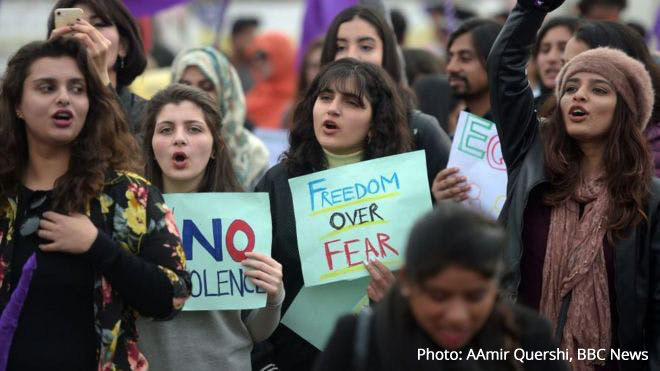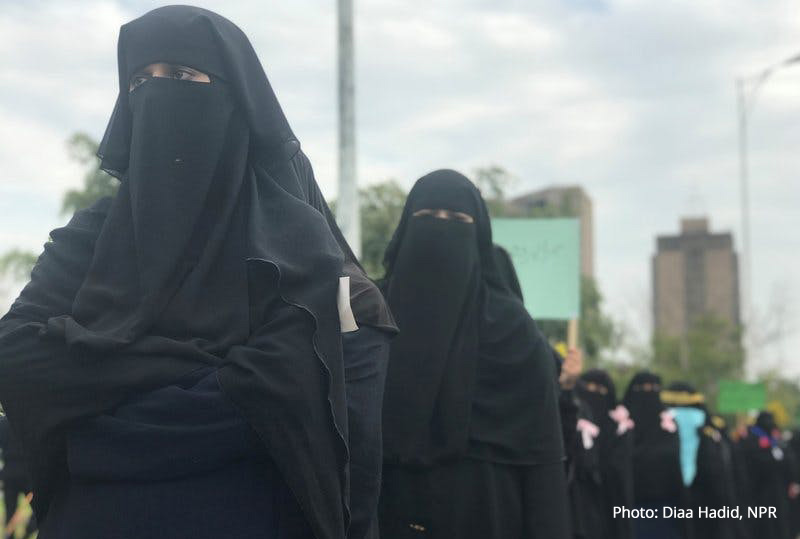Several readers of Uncovering have asked about the status of women in Pakistan: Is there a women’s movement? Is it just in the northwest areas of the country that strong conservative beliefs about women’s role prevail? How prevalent are the conservative voices? I’d like to use the example of the celebration of International Women’s Day 2020 to address these questions.
The Women’s March
Women planned a series of rallies for Sunday, March 8, 2020 in the three major Pakistani cities of Karachi, Lahore, and Islamabad. These events, called the Aurat March or Women’s March, were set to mark the day, hoping this year to focus on economic equality. The CNN report of the day[1] explains several complaints, “…as Pakistan grapples with issues including incest, rape, child abuse and female genital mutilation, the feminist cause is important. Pakistan ranked 151 out of 153 countries in the World Economic Forum’s Global Gender Gap Index Report 2020. In 2019, Pakistan Human Rights Watch (HRW) found that over 5 million primary school-age children in Pakistan were out of school, ‘most of them girls.’ Another HRW report said that ‘early marriage remains a serious problem, with 21 percent of girls in Pakistan marrying before the age of 18.’ The United Nations Population Fund has reported that Pakistan has one of the highest maternal mortality ratios in South Asia.” All of which suggests that, if women are to reach their goal of equality with men, there is a great deal of reason behind these feminist marches.

But there were objections to the very idea of such a march, well before the day it was scheduled. Conservative lawyers in Islamabad and Lahore asked the courts to ban the affair, arguing vociferously against a sign sometimes seen in earlier marches: “My body, my choice.” The slogan was declared to be against the “norms of Islam.” Both cases were dismissed.
A Rival March
The cleric at the conservative Red Mosque in Islamabad mobilized the students at the mosque’s female madrassa Jamia Hafsa. (You may remember these institutions from Uncovering). Teachers and students organized a rival “modesty march.” According to Diaa Hadid, reporting for NPR,[1] “dozens of the seminary women turned up at the counter rally, clad in long black robes, headscarves and face veils (see picture below), segregated from dozens of men who stood in a nearby park. They stood in military-style rows, their fearsome appearance only jarred by blue, green and pink bows pinned to their shoulders, to identify which bus they should return on, explained one 25-year-old, who only gave her first name, Rubina. ‘We don’t want women to make choices for their bodies. The choice rests with God,’ she said.”

And there were others objecting as well. Diaa Hadid again: “Demonstrators belonging to Islamist groups attacked an International Women’s Day rally in … Islamabad on Sunday, hurling rocks, chunks of mud and even their shoes. … As the protest was winding down, dozens of men tried to push through the police barricade… According to a video uploaded to Twitter by a BBC reporter, police used batons to push them back. Still, for the next few minutes, they hurled projectiles that scattered the women’s day protesters, as journalists huddled behind concrete road dividers.”
Feminism and Islam
CNN also reported that one of the organizers of the Islamabad March, Tooba Syed, said, “Feminists are seen as bad women because talking about the body is so taboo. It’s a politicization of the private sphere of family life—any discussion about taking women out of the confines of the home causes a backlash.” … “Syed added that in Pakistan it is still controversial to even use the word body because ‘bodies are controlled, reproductive rights are controlled, traditional gender roles in society are controlled’ by men.”
2020 is the third year of a women’s day march, suggesting there is a strong push from women to organize and press for reforms.. They continue to move forward to initiate societal change through peaceful means, following the rule of law (or arguing that the laws be amended). But there doesn’t seem to be great public will for such changes, and the conservative religious establishment throughout the country is strong and vocal. Government chiefs and law-makers must continual define the fine line they will walk to enforce their rules of law and yet honor the fundamentalist beliefs of many of their citizens. The country is, after all, The Islamic Republic of Pakistan. The issue is the interpretation of Islam that should be followed.
[1] They plan to march for gender equality. In Pakistan, that has caused outrage.
By Sophia Saifi, CNN; Updated 10:14 PM ET, Sat March 7, 2020. Available at:
https://www.cnn.com/2020/03/07/asia/pakistan-womens-marches-intl-hnk/index.html
[2] International Women’s Day: With Shoes and Stones, Islamists Disrupt Pakistan Rally. March 8. 2020 2:18 pm ET, By Diaa Hadid/NPR. Available at: